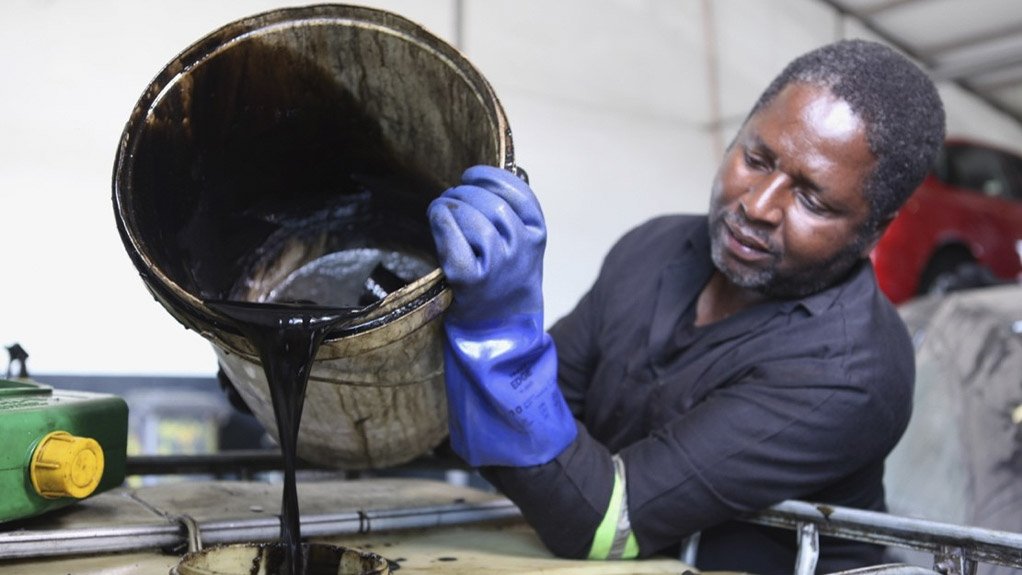The ROSE Foundation celebrates 30years of success in used oil recycling
This article has been supplied as a media statement and is not written by Creamer Media. It may be available only for a limited time on this website.
More than 1.5 billion litres of hazardous used motor oil has been kept out of the environment, thanks to the efforts of the ROSE Foundation (Recycling Oil Saves the Environment) which celebrates 30 years of successfully driving the responsible recycling of used lubricating oil.
ROSE, a non-profit organisation that was established by the major lubricant manufacturers and distributors in South Africa, is an example of a successful leader in the voluntary formation of an Extended Producer Responsibility (EPR) programme in South Africa.
Approximately 300 million litres of new lubricant oil is sold in South Africa every year. The new oil is a combination of locally manufactured, as well as imported lubes. Of the oil that is sold, approximately 150 million litres becomes used oil, of which 120 million litres is collectable for recycling.
Considering that used oil is full of contaminants that are dangerous to the environment – with one litre capable of contaminating one million litres of water – a vast amount of a hazardous substance that could make its way into our environment were it not for the efforts of the ROSE Foundation.
The formation of the ROSE Foundation to drive used oil recycling, was initiated in April 1994, after the government withdrew support for the used oil re-refining industry. Previously, lubricants were taxed to subsidise the re-refining of used oil back into lubricating oil. When this subsidy was removed, the major lubricant companies operating in South Africa took it upon themselves to help protect the environment. They formed the ROSE Foundation as part of an extended producer responsibility initiative, to encourage responsible recycling and to prevent the indiscriminate dumping and burning of used lubricating oil.
“This year we celebrate 30 years of excellence in the collection, transportation, storage and recycling of used oil. Our collectors and processors are the real heroes, and they deserve to be commended for the difficult work they do to protect our environment from being contaminated by used oil,” said Bubele Nyiba, CEO of the ROSE Foundation.
Currently, ROSE has 192 collectors and 23 processors working with the organisation to ensure safe and compliant recycling. “We have grown from small beginnings to a significant organisation of members - ROSE is a the home for all almost lubricant producers in terms of EPR,” says Nyiba.
A sustainable recycling model
ROSE has been praised by government and other industries for its successful model – which has been recognised globally as best practice – and for being a leader in promoting and encouraging environmentally responsible management of used lubricating oils and related waste in South Africa.
“Recycling used oil not only protects the environment, but also creates cost-efficient products for our economy, which is exactly what sustainable recycling should achieve,” says Nyiba.
Most used oil in South Africa is processed to remove certain impurities before being recycled into burner fuel, which is used in furnaces and boilers for the production of a wide range of products. Processing reduces hazardous air emissions and the end product is cheaper than other sources of industrial fuel, like diesel and illuminating kerosene. Some of the used oil is recycled (re-generated) back into new oil.
Employment & business opportunities
Retrieving and recycling used oil has proved to be a lucrative enterprise. At least 1,300 people ranging from drivers, labourers and administrators to operators and managers, are employed in the sector. The employment profile is predominantly male (85%) and African (64%). ROSE describes the used oil recycling industry as a success story on many levels: “The industry is sustainable in that it not only employs many people, but it also enables entrepreneurship,” says Nyiba.
The single biggest challenge facing the used oil sector is when companies collect and transport oil without proper accreditation and legal compliance. The ROSE licensing and training system endeavours to ensure generators of used oil know that they are dealing with reputable collectors.
All recycling models need to be sustainable and need to work towards a circular economy to be viable in the long term. ROSE has proved that recycling protects the environment, creates widespread employment opportunities and has a knock on financial benefit for many.
Extended Producer Responsibility
ROSE spearheaded Extended Producer Responsibility - an essential requirement in waste management - 30 years ago, long before it was a legal requirement in South Africa. The organisation is a case-study example of a successful EPR programme that was voluntarily implemented,” says Nyiba.
Since 2023, EPR for lubes is no longer voluntary. ROSE Foundation is now registered with the Department of Forestry, Fisheries and Environment (DFFE) as a Product Responsibility Organisation (PRO) for lubricants, in terms of government EPR Regulations.
“We would like thank all the oil companies that have registered as producers of lubricants on the EPR database - this is an important step in the implementation of EPR,” says Nyiba.
Used oil’s potential to pollute the environment, coupled with the fact that it can be recycled many times over, without losing efficacy, creates a powerful imperative to responsibly collect and recycle it.
“ROSE champions the Petroleum industry’s ‘cradle to grave’ philosophy for used oil management. We will continue to build on the successful track record of the ROSE Foundation, and look forward to accounting for the collection of many more millions of litres of used oil to ensure a cleaner and safer environment for the next generation,” says Nyiba.
Comments
Press Office
Announcements
What's On
Subscribe to improve your user experience...
Option 1 (equivalent of R125 a month):
Receive a weekly copy of Creamer Media's Engineering News & Mining Weekly magazine
(print copy for those in South Africa and e-magazine for those outside of South Africa)
Receive daily email newsletters
Access to full search results
Access archive of magazine back copies
Access to Projects in Progress
Access to ONE Research Report of your choice in PDF format
Option 2 (equivalent of R375 a month):
All benefits from Option 1
PLUS
Access to Creamer Media's Research Channel Africa for ALL Research Reports, in PDF format, on various industrial and mining sectors
including Electricity; Water; Energy Transition; Hydrogen; Roads, Rail and Ports; Coal; Gold; Platinum; Battery Metals; etc.
Already a subscriber?
Forgotten your password?
Receive weekly copy of Creamer Media's Engineering News & Mining Weekly magazine (print copy for those in South Africa and e-magazine for those outside of South Africa)
➕
Recieve daily email newsletters
➕
Access to full search results
➕
Access archive of magazine back copies
➕
Access to Projects in Progress
➕
Access to ONE Research Report of your choice in PDF format
RESEARCH CHANNEL AFRICA
R4500 (equivalent of R375 a month)
SUBSCRIBEAll benefits from Option 1
➕
Access to Creamer Media's Research Channel Africa for ALL Research Reports on various industrial and mining sectors, in PDF format, including on:
Electricity
➕
Water
➕
Energy Transition
➕
Hydrogen
➕
Roads, Rail and Ports
➕
Coal
➕
Gold
➕
Platinum
➕
Battery Metals
➕
etc.
Receive all benefits from Option 1 or Option 2 delivered to numerous people at your company
➕
Multiple User names and Passwords for simultaneous log-ins
➕
Intranet integration access to all in your organisation




















